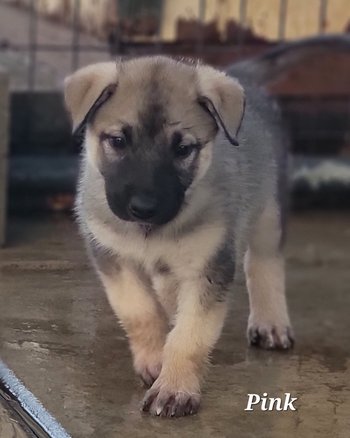NEW scientific breakthrough for dogs
By Jennifer Stoeckl, MAT - Dire Wolf Project CEO, Sept. 27, 2023
Technological advancements are sky rocketing at hyper speed.
Not all that long ago, our human species created the first computer,
then the personal computer,
then a network of computers,
then various service providers…
culminating in our species’ most incredible invention to date…
the Internet.
Well, science is also racing toward some incredible advancements.
Regardless of whether it’s morally right or wrong, humans can now grow real meat in a lab.
2022 saw the first xenotransplantation where a pig’s heart was successfully transplanted into a human.
If that wasn’t enough…
For the first time ever, researchers have been able to revive an entire pig’s organs an hour after its death. Using a special machine called OrganEx, researchers pumped blood and bodily fluids into the organism's circulatory system, revitalizing the animal’s organs to the point of cellular repair. The implications of this new ability may forever alter the medical field.
The human genome has now been 100% mapped.
Human brain cells have now been successfully implanted into rats.
(The Secret of Nimh anyone?)
2-million-year-old DNA has been found intact in Greenland under layers of ice.
(We’re getting closer to Jurassic Park!)
Lab-grown brain cells learned to play a simple video game called Pong.
(Maybe someday humans WILL upload their brains onto the cloud!)
AND…
Molecular biologists are advancing biogenomics at an impressive rate.
Only three days ago in USA TODAY, it was revealed that an antiviral intravenous medication developed by Elanco can now stop parvovirus symptoms from damaging a puppy’s digestive system.
Parvovirus is the most deadly and contagious virus affecting puppies.
While vaccination aids in antibody production, puppies under a certain age don’t typically have the immunity they need to fend off the virus.
It is estimated that 330,000 parvovirus cases are diagnosed each year.
That’s around 900 cases a DAY!
Furthermore, parvovirus has a 91% mortality rate for any puppy left untreated.
So, as a dog breeder, I perk up at such news that a medication may be able to stop the deadly symptoms of parvovirus in its tracks, producing a 100% recovery rate for one intravenous dose.
BUT…
Not all is as it seems.
I had some serious concerns about it right from the start.
When I looked into it, sure enough, my concerns were validated.
You see, antiviral medication works like this…
- Researchers manufacture a protein to act like a viral antibody.
- They then create the structure of the protein so it binds to the virus, inhibiting it from entering a host cell.
- When the virus can’t enter the targeted cell, it dies.
Sounds great, right?!
It’s like the virus was never there because the cells are no longer able to be affected by the virus. The virus simply dies off when it can’t receive what it needs from the cells to survive.
Here’s the problem, though:
Without the dog’s cells becoming affected, there is no communication within the dog’s body to trigger antibody production.
No antibody production = NO FUTURE IMMUNITY!
And…
What’s more is…
Once the foreign man-made proteins (monoclonal antibodies) enter the dog’s molecular structure, what happens to future vaccinations for parvovirus?
Parvo vaccines are made up of MODIFIED LIVE PARVOVIRUS!
In other words, parvo vaccines house millions of little live parvovirus entities that have been rendered impotent, but can still trigger the body’s own antibody production.
But, if the man-made proteins (monoclonal antibodies) linger within the puppy’s cellular make-up, they will bind to the vaccine’s modified parvovirus, rending the vaccine completely ineffective!
And…
Researchers do NOT know how long these man-made antibodies will remain in the puppy’s system.
Here’s a quote from Elanco’s website, “Currently it is not known how long CPMA [monoclonal antibodies] will interfere with vaccination. Along with active immunity initiated by the naturally occurring parvovirus infection, the use of this monoclonal antibody as therapeutic treatment may interfere with subsequent parvovirus vaccination. For advice on parvovirus vaccination scheduling after use, consult your veterinarian.”
Normal naturally created antibodies can linger in the puppy’s system for 7 years or more, according to some studies.
Plus, once a puppy produces parvovirus antibodies, the code from producing these antibodies is retained in the DNA for future use, allowing the more rapid production of natural antibodies in the future should the dog require them.
If man-made antibodies linger in a puppy’s system, this may prevent parvovirus vaccination efficacy.
They may also aid the puppy should it acquire parvovirus in the future, but NO code will have been created in the puppy’s DNA for subsequent parvovirus acquisition.
This is uncharted territory, folks.
And until I know more about the long-term effects of man-made antibodies, I will continue to vaccinate our puppies at 5 weeks old with Neopar as we have been doing, which has allowed us to eradicate parvovirus symptoms from reappearing in our litters.
If you’re curious about our puppy vaccination schedule, here’s the link to learn more:
https://direwolfproject.com/direwolf-guardians/puppy-training/puppy-health/vaccination/
Enjoy this beautiful day!
REFERENCES
- Elanco’s Canine Parvovirus Monoclonal Antibody
https://yourpetandyou.elanco.com/us/our-products/canine-parvovirus-monoclonal-antibody - USA TODAY
First-of-its-kind parvo treatment may revolutionize care for highly fatal puppy disease
https://www.usatoday.com/story/news/nation/2023/09/23/treatment-for-parvo-in-dogs-nears-usda-approval/70922537007/
PS: Don’t forget TODAY is our monthly Winged Wolf Clan Meeting!
Sept. 27, 2023 - 5 PM EST
The Sensitive & Intuitive Dog
LMK if you are planning to attend please so we have a better tally.
The Zoom portal is: https://us02web.zoom.us/j/6802073488
The RSVP link is: https://fb.me/e/1spdKuYxk
Jennifer Stoeckl is the co-founder of the Dire Wolf Project, founder of the DireWolf Guardians American Dirus Dog Training Program, and owner/operator of DireWolf Dogs of Vallecito. She lives in the beautiful inland northwest among the Ponderosa pine forests with her pack of American Dirus dogs.